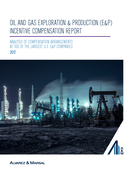As incentive compensation continues to be an integral part of the total compensation package for executives at publicly traded companies, A&M's Executive Compensation and Benefits Practice has conducted an analysis of the compensation arrangements at the 100 largest U.S. exploration and production companies.
In the 2017 Oil and Gas Exploration & Production (E&P) Incentive Compensation Report, we examine the latest trends in incentive compensation, as well as total compensation packages for Chief Executive Officers and Chief Financial Officers in the energy sector and the benefits to which those executives are entitled upon a change in control. Finally, with the current state of the commodity markets, we address compensation arrangements at distressed E&P companies.

GET THE REPORT:
Oil and Gas Exploration & Production (E&P) Incentive Compensation Report
China’s Notice 4 Reinstates VAT on Bond Interest Income from new bonds issued on or after August 8, 2025
August 24, 2025
Learn how China’s Notice 4 reinstates VAT on interest income from various bonds issued since August 8, 2025, and the significance for foreign investors.
Managing Director Kevin M. Jacobs Featured in American Bankruptcy Institute Journal
August 21, 2025
The corporate landscape is riddled with uncertainties: fluctuating interest rates, unpredictable tariffs, tax reform and the
application of the “book minimum tax” (BMT). In effect since 2023, this tax could blindside companies with an unexpected bill, significantly impacting restructuring plans.
A summary of the Early Stage Venture Capital Limited Partnership rules
August 18, 2025
Learn how Australian's Early Stage Venture Capital LP regime stimulates early-stage venture investment with tax concessions for investors and fund managers.
Commissioner falls flat in PepsiCo High Court appeal… but on a steak knife’s edge
August 14, 2025
On 13 August 2025 the High Court of Australia (HCA) handed down its decision in Commissioner of Taxation v PepsiCo, Inc and Commissioner of Taxation v Stokely-Van Camp, Inc [2025] HCA 30.





